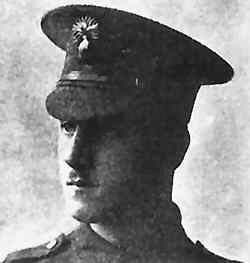Alfred Oliver Pollard facts for kids
Quick facts for kids
Alfred Oliver Pollard
|
|
|---|---|
 |
|
| Born | 4 May 1893 Wallington, Surrey |
| Died | 5 December 1960 (aged 67) Bournemouth, Dorset |
| Allegiance | |
| Service/ |
|
| Rank | Captain |
| Unit | Honourable Artillery Company |
| Battles/wars | World War I |
| Awards | Military Cross & Bar Distinguished Conduct Medal |
| Other work | Author |
Alfred Oliver Pollard (born May 4, 1893 – died December 4, 1960) was a brave English soldier. He received the Victoria Cross (VC), which is the highest award for courage in battle for British and Commonwealth soldiers. After his military career, he became a well-known author, writing many exciting crime and mystery books.
Contents
A Hero in World War I
Alfred Oliver Pollard was born in Wallington, Surrey. He went to St Olave's Grammar School and Merchant Taylors' School. When World War I began on August 8, 1914, he volunteered to join the British Army. Before this, he worked as a clerk at an insurance company.
Pollard spent most of the war fighting on the Western Front in Europe. He was injured twice but bravely returned to his unit each time after he recovered. In September 1915, as a sergeant, he earned the Distinguished Conduct Medal (DCM). This award was for his bravery in Sanctuary Wood, near Ypres Salient.
In January 1916, he became a second lieutenant in the Honourable Artillery Company. He earned the Military Cross (MC) twice for his courage before receiving the Victoria Cross.
Pollard's Amazing Bravery
On April 29, 1917, in Gavrelle, France, the battle was very tough. Many soldiers were injured by heavy shelling, and a strong enemy attack caused confusion. Second Lieutenant Pollard saw how serious the situation was. With only four other men, he bravely started a counter-attack using bombs.
He pushed forward until he broke the enemy's attack. He not only won back the lost ground but also gained more territory. Pollard's incredible example inspired every soldier who saw him. His bravery during the war earned him the most awards of any soldier in his unit. He received his Victoria Cross and Military Cross with a Bar at Buckingham Palace on July 21, 1917.
Today, his Victoria Cross is kept by the Honourable Artillery Company in London. A copy is on display in their Medal Room.
Life After the War
After World War I ended in 1918, Pollard found it difficult to settle into a normal life. He tried several different jobs. In June 1924, he joined the Royal Air Force as a pilot. He left the Air Force in December 1926.
Then, Pollard became a full-time writer. In 1932, he published his autobiography, Fire-Eater: the Memoirs of a VC. This book tells about his experiences during the war, from joining the army to the end of the fighting. He wrote about 60 other books over three decades. Most of these were exciting mystery, murder, or spy novels. He also wrote columns for newspapers in London and other cities. Sometimes, he even broadcast on BBC radio.
Pollard passed away at age 67 on December 5, 1960, in Bournemouth. He was cremated at Bournemouth Crematorium.
Pollard's Family Life
Alfred had an older brother named Frank. Frank was also a member of the Honourable Artillery Company. However, when he thought he wouldn't be sent to the front lines, he left and joined the Grenadier Guards. Sadly, Frank was killed in action in September 1916. This happened just before he was supposed to return to England for an officer training course.
In 1918, Alfred Pollard married Mary Ainsley. They divorced in 1924. In September 1925, he married Violet Irene Swarbrick. Alfred Pollard did not have any children from either marriage.
His Books
Alfred Oliver Pollard wrote many books. Here are a few examples:
- Fire-Eater. The memoirs of a VC (1932)
- The Royal Air Force. A concise history ... With 24 illustrations (1934)
- The Secret Formula (1939)
- Bombers Over the Reich. (1941)
- Wanted by the Gestapo (1942)
- The Fifth Freedom (1945)
- The Golden Budda (David Wilshaw Investigates) (1951)
- Smuggler's Buoy (1958)

